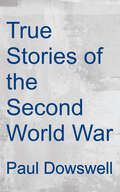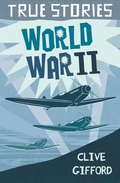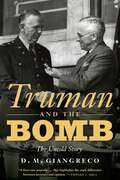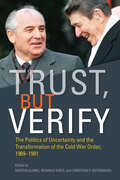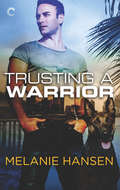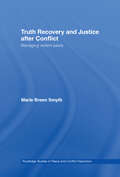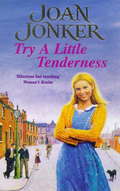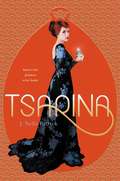- Table View
- List View
True Stories of the First World War
by Paul DowswellToday, almost a century after it was fought, the First World War still haunts us. With its aircraft, submarines, machine guns and tanks, it was the first modern war.
True Stories of the SAS
by Robin HunterThe soldiers of the SAS are among the most ruthless and efficient in the world. Their daring and determination have made Britain's top-secret military unit one of the most feared and respected special forces in existence. True Stories of the SAS is a history of the deeds done by these lethal men as they faced danger with calm courage. From the parachute raids and jeep attacks of World War II to covert activity in the Gulf War, the SAS have fought in each major conflict of the last fifty years. Their every mission is a tale of inspired strategy and decisive action, from the fight for the German-held islands of the Aegean to the struggle against the Communists in the Malayan jungle and their spectacular success at the Iranian Embassy siege in London. These astonishing stories reveal the bravery, endurance and sheer military brilliance that have made the SAS truly a force to be reckoned with.
True Stories of the SAS
by Robin HunterThe soldiers of the SAS are among the most ruthless and efficient in the world. Their daring and determination have made Britain's top-secret military unit one of the most feared and respected special forces in existence.True Stories of the SAS is a history of the deeds done by these lethal men as they faced danger with calm courage. From the parachute raids and jeep attacks of World War II to covert activity in the Gulf War, the SAS have fought in each major conflict of the last fifty years. Their every mission is a tale of inspired strategy and decisive action, from the fight for the German-held islands of the Aegean to the struggle against the Communists in the Malayan jungle and their spectacular success at the Iranian Embassy siege in London.These astonishing stories reveal the bravery, endurance and sheer military brilliance that have made the SAS truly a force to be reckoned with.
True Stories of the Second World War
by Paul DowswellTrue Stories of the Second World War is a collection of short stories about some of the events of World War II and the people involved. This is a paperback book of about 170 pages. Each story in this collection covers a different perspective of the war. Some of the topics include the battleship Bismarck, women aviators in the Soviet Air Force, the Nazis involved in the "final solution", British spies, and the development of the atomic bomb and its use by the United States to end the war. All of the stories are fairly short, running from 10 to 20 pages or so, enough to develop the main theme without too much detail. Sections at the beginning and end discuss the start and end of the war, providing a background to reference the stories against. <p><p>One strength of this book is that the stories are often sprinkled with first-person memories of the people associated with the story. This aspect helps one to grasp the impact of those troubled times on the people involved in the conflict. It includes stories that will be familiar to historians, but are probably unknown in the current era. Any reader interested in learning more about the Second World War will find this book a quick primer that covers a wide variety of topics in clear and simple language. The stories are real, and the first-person perspective increases their interest to the reader.
True Stories: World War One (True Stories Ser.)
by Clive GiffordThe book contains nine short stories dealing with different aspects of life during World War I. World War I includes the stories of flying aces such as the 'Red Baron', the story of Lawrence of Arabia and the stories of brave doctors and nurses such as Edith Cavell in German occupied Belgium. Complete with glossary, further reading section and index.
True Stories: World War Two (True Stories Ser.)
by Clive GiffordThe book contains nine short stories dealing with different aspects of life during World War II. Included is the remarkable survival story of future US President J F Kennedy, the story of the dambusters and a plotted assassination attempt on Hitler. Complete with glossary, further reading section and index.
True Tales of Life & Death at Fort Adams (Landmarks Ser.)
by Kathleen Troost-CramerThe story of a historic Newport, Rhode Island, landmark shadowed by tragedy.For 150 years, Fort Adams guarded the strategic entrance to Narragansett Bay and Newport Harbor. It was the largest coastal fortification in the United States, and though the site never saw a battle, its history is shadowed with dark tragedy. The fort witnessed its first death in 1819 when Private William G. Cornell shot Private William Kane point-blank and without remorse over an unknown argument. Unfortunately, more tragedy would follow. In 1871, twenty-eight-year-old George F. Drake slit his own throat after his sweetheart ended their relationship. And in 1879, Private Franz Koppe was mysteriously attacked, later dying of his injuries. The Spanish influenza arrived at Fort Adams in 1918, killing five soldiers in one month. Through these stories of life and death, author Kathleen Troost-Cramer traces the history of this national landmark.Includes maps and photos
True Tales of Puget Sound (American Legends)
by Dorothy Wilhelm Dave Ross - Broadcaster and CommentatorFrom the shores of Gig Harbor to the slopes of Mount Rainier, the towns surrounding Puget Sound all have incredible stories to share. How did Old Fort Nisqually, now perched on a lofty bluff above Tacoma, move twenty-two miles from its original 1843 site in DuPont? Did Eatonville's copper-infused paint inspire the phrase "painting the town red"? Read about the famed Pie Goddess of Enumclaw and about a cookbook compiled by Emma Smith DeVoe of Parkland that included helpful tips from suffragettes. Join author Dorothy Wilhelm, of the television show My Home Town, as she explores these beloved town tales and uncovers the rest of the story.
True Valor (Uncommon Heroes #2)
by Dee HendersonGrace and Bruce are both active military, used to the long away missions. But can their budding relationship survive the distance and dangers that both of their jobs require? Can Bruce get to Grace when one of those dangers becomes an all too real reality?
True to My God and Country: How Jewish Americans Fought in World War II (Studies in Antisemitism)
by Françoise S. OuzanTrue to My God and Country explores the role of the more than half a million Jewish American men and women who served in the military in the Second World War. Patriotic Americans determined to fight, they served in every branch of the military and every theater of the war. Drawing on letters, diaries, interviews, and memoirs, True to My God and Country offers an intimate account of the soul-searching carried out by young Jewish men and women in uniform. Ouzan highlights, in particular, the selflessness of servicewomen who risked their lives in dangerous assignments. Many GIs encountered antisemitism in the American military even as they fought the evils of Nazi Germany and its allies. True to My God and Country examines how they coped with anti-Jewish hostility and reveals how their interactions with Jewish communities overseas reinforced and bolstered connections to their own American Jewish identities.
Trujillo and Other Stories
by Lucius ShepardIn the town of Trujillo, in Honduras, on the edge of the Mosquito Coast, Dr. Arturo Ochoa, a semi-retired psychiatrist, has a single patient: a troubled young man named Thomas Stearns, the son of a wealthy Atlanta family. Stearns has been found adrift on the Caribbean in a vessel owned by two Nicaraguans, both of whom are missing; he has been alone for eighteen days and has little memory of that time. Suspected of murder, Stearns is unconcerned. He knows his family will buy off the police. But he is reluctant to leave Trujillo, having developed an odd affinity for the town. As therapy progresses, he tells of a mysterious stone figure regurgitated by, improbably, a whirlpool, and Dr. Ochoa - drawn into his pathology - begins to doubt not only Stearns' sanity, but his own . . .
Trullion: Alastor 2262 (Gateway Essentials #210)
by Jack VanceTrullion - World 2262 of the Alastor Cluster - was a beautiful waterworld of fens, mists, idyllic islands set in clear oceans whose teeming richness provided food for the taking. The Trill were a carefree, easy-living race. But violence entered their lives during the raids of the galactic pirates known as the Starmenters. And there was also the planetwide game of hussade, when the Trill's ferocious passion for gambling drove them to risk all - even life itself - on the hazardous water-chessboard gaming fields. Their prize? The virginal body of the beautifu sheirl-maiden, the body any Trill is willing to die for.
Truly Sweet: A Sweet, Texas Novel (Sweet, Texas #5)
by Candis TerryWhen the one you've always wanted . . .At sixteen, Annabelle Morgan hoped her crush on Jake Wilder was just a passing phase. Now she's twenty-nine and nothing has changed—except Jake. The once-carefree Marine has come home with a giant chip on his shoulder. He insists a single mom like Annie deserves more than he can offer. Yet no matter how gruff his gorgeous exterior may be, Jake's toe-curling kisses convince her that this attraction is definitely mutual.Becomes the one who wants you back . . .Butting heads with feisty Annie was always a thrill. Add other body parts to the mix, and Jake is in serious trouble. He can't be a forever-and-family guy—and Annie's not a friends-with-benefits kind of woman. But love has a way of changing the best-laid plans, and surrender has never been so tempting . . .The outcome is truly sweet.
Truman and the Bomb: The Untold Story
by D. M. GiangrecoMany myths have grown up around President Harry S. Truman&’s decision to use nuclear weapons against Imperial Japan. In destroying these myths, Truman and the Bomb will discomfort both Truman&’s critics and his supporters, and force historians to reexamine what they think they know about the end of the Pacific War.Myth: Truman didn&’t know of the atomic bomb&’s development before he became president. Fact: Truman&’s knowledge of the bomb is revealed in his own carefully worded letters to a Senate colleague and specifically discussed in the correspondence between the army officers assigned to his Senate investigating committee.Myth: The huge casualty estimates cited by Truman and Secretary of War Henry Stimson were a postwar creation devised to hide their guilt for killing thousands of defenseless civilians. Fact: The flagrantly misrepresented &“low&” numbers are based on narrow slices of highly qualified—and limited—U.S. Army projections printed in a variety of briefing documents and are not from the actual invasion planning against Japan.Myth: Truman wanted to defeat Japan without any assistance from the Soviet Union and to freeze the USSR out of the postwar settlements. Fact: President Franklin D. Roosevelt and President Truman desperately wanted Stalin&’s involvement in the bloody endgame of World War II and worked diligently—and successfully—toward that end. Using previously unpublished material, D. M. Giangreco busts these myths and more. An award-winning historian and expert on Truman, Giangreco is perfectly situated to debunk the many deep-rooted falsehoods about the roles played by American, Soviet, and Japanese leaders during the end of the World War II in the Pacific. Truman and the Bomb, a concise yet comprehensive study of Truman&’s decision to use the atomic bomb, will prove to be a classic for studying presidential politics and influence on atomic warfare and its military and diplomatic components. Making this book particularly valuable for professors and students as well as for military, diplomatic, and presidential historians and history buffs are extensive primary source materials, including the planned U.S. naval and air operations in support of the Soviet invasion of Manchuria. These documents support Giangreco&’s arguments while enabling the reader to enter the mindsets of Truman and his administration as well as the war&’s key Allied participants.
Truman, MacArthur and the Korean War
by Dennis D. WainstockAt 4:00 a.m. on June 25, 1950, North Korean artillery began pounding South Korean positions: the Korean War began. American officials had seriously underestimated the North Korean forces that quickly invaded South Korea nearly overrunning the country. US intelligence had failed to predict the attack. In Japan General Douglas MacArthur was sending in gloomy reports after President Truman had decided the United States had to stand up to Communist aggression in East Asia. A duel began between the president and the general throughout the first full year of the war, ending with the sacking of the man many Americans considered a national hero.
Trump Revealed: An American Journey Of Ambition, Ego, Money, And Power
by Marc Fisher Michael Kranish<P>A comprehensive biography of Donald Trump, the Republican candidate in the presidential election campaign. Trump Revealed will be reported by a team of award-winning Washington Post journalists and co-authored by investigative political reporter Michael Kranish and senior editor Marc Fisher. <P>Trump Revealed will offer the most thorough and wide-ranging examination of Donald Trump's public and private lives to date, from his upbringing in Queens and formative years at the New York Military Academy, to his turbulent careers in real estate and entertainment, to his astonishing rise as the Republican presidential nominee. <P>The book will be based on the investigative reporting of more than two dozen Washington Post reporters and researchers who will leverage their expertise in politics, business, legal affairs, sports and other areas. The effort will be guided by a team of editors headed by Executive Editor Martin Baron, who joined the newspaper in 2013 after his successful tenure running The Boston Globe, which included the "Spotlight" team's investigation of sexual abuse in the Catholic Church. <P><b>A New York Times Bestseller</b>
Trump and His Generals: The Cost of Chaos
by Peter BergenFrom one of America's preeminent national security journalists, an explosive, news-breaking account of Donald Trump's collision with the American national security establishment, and with the worldIt is a simple fact that no president in American history brought less foreign policy experience to the White House than Donald J. Trump. The real estate developer from Queens promised to bring his brash, zero-sum swagger to bear to cut through America's most complex national security issues, and he did. If the cost of his "America First" agenda was bulldozing the edifice of foreign alliances that had been carefully tended by every president from Truman to Obama, then so be it.It was clear from the first that Trump's inclinations were radically more blunt force than his predecessors'. When briefed by the Pentagon on Iran and the Strait of Hormuz, he exclaimed, "The next time Iran sends its boats into the Strait: blow them out of the water! Let's get Mad Dog on this." When told that the capital of South Korea, Seoul, was so close to the North Korean border that millions of people would likely die in the first hours of any all-out war, Trump had a bold response, "They have to move." The officials in the Oval Office weren't sure if he was joking. He raised his voice. "They have to move!"Very quickly, it became clear to a number of people at the highest levels of government that their gravest mission was to protect America from Donald Trump. Trump and His Generals is Peter Bergen's riveting account of what happened when the unstoppable force of President Trump met the immovable object of America's national security establishment--the CIA, the State Department, and, above all, the Pentagon. If there is a real "deep state" in DC, it is not the FBI so much as the national security community, with its deep-rooted culture and hierarchy. The men Trump selected for his key national security positions, Jim Mattis, John Kelly, and H. R. McMaster, were products of that culture: Trump wanted generals, and he got them. Three years later, they would be gone, and the guardrails were off. From Iraq and Afghanistan to Syria and Iran, from Russia and China to North Korea and Islamist terrorism, Trump and His Generals is a brilliant reckoning with an American ship of state navigating a roiling sea of threats without a well-functioning rudder. Lucid and gripping, it brings urgently needed clarity to issues that affect the fate of us all. But clarity, unfortunately, is not the same thing as reassurance.
Trust But Verify
by Karna Small Bodman"Bodman's hard-won information and sheer storytelling talent make this a book to remember.” —LEE CHILD, #1 worldwide bestselling author of the Jack Reacher series "Karna Bodman’s Trust But Verify is a riveting page-turner you won’t want to put down!" - CARLA NEGGERS, bestselling author of Imposter's Lure Samantha Reid, the brilliant Director of the White House Office of Homeland Security, is enjoying a rare evening away from Washington at a Florida charity ball when a bomb sends the well-heeled attendees stampeding into the night. Narrowly escaping the blast, Reid returns to the White House, where she has been trailing the massacres and illicit arms sales of a shadowy group of Russian oligarchs... all of whom want her dead. Caught in an ever-tightening spiral of lies and ruthless hitmen, Reid must race the clock against her assassins. But she's not alone. When FBI special agent Brett Keating discovers Samantha was the target of the Florida bomb, he resolves to protect her, while also unravelling a brazen plot that threatens the lives of international financial leaders and stock markets worldwide.
Trust, but Verify: The Politics of Uncertainty and the Transformation of the Cold War Order, 1969-1991
by Martin Klimke Christian Ostermann Reinhild KreisTrust, but Verify uses trust--with its emotional and predictive aspects--to explore international relations in the second half of the Cold War, beginning with the late 1960s. The détente of the 1970s led to the development of some limited trust between the United States and the Soviet Union, which lessened international tensions and enabled advances in areas such as arms control. However, it also created uncertainty in other areas, especially on the part of smaller states that depended on their alliance leaders for protection. The contributors to this volume look at how the "emotional" side of the conflict affected the dynamics of various Cold War relations: between the superpowers, within the two ideological blocs, and inside individual countries on the margins of the East-West confrontation.
Trusting a Warrior (Loving a Warrior #3)
by Melanie HansenGeorge Monteverdi always had one goal, to become a navy SEAL. Now both a SEAL and a K-9 handler, saving lives is his priority. When tragedy touches his own life, he handles it—with the help of his crew and his dog Bosch. Having those guys by his side means he’ll never be alone…though any sort of romance feels like a far away dream.Heartbroken after her fiancé falls in love with another woman, Lani Abuel seeks comfort in the arms of a stranger, only to find herself pregnant and alone. She’ll do whatever it takes to be a good mother, which means finally facing the trauma in her past. The last thing she expected was a warrior with wounds all too similar to hers finding his way into her heart and loving her child as his own.As their worlds entwine, Lani and Geo find the joy and redemption they’ve been seeking. But despite the sanctuary they’ve created, a forever love seems impossible. A K-9 handler who spends most of his time deployed with his SEAL team, staring danger in the eye, is far from what Lani—or her baby—needs, and Geo can’t imagine a future doing anything else.
Trusting the Rancher with Christmas: A Clean Romance (Three Springs, Texas #2)
by Cari Lynn WebbA visit for the holidaysBrings love for a lifetimeCattle rancher Evan Bishop is desperate for Paige Palmer&’s help. The veterinarian is in Three Springs for the holidays, but the single dad hopes she has time to save his ailing livestock. Paige is up for the challenge, though not quite up to resisting the cowboy&’s rugged charm and his darling devotion to his little girl. Can Paige learn to trust the rancher before the countdown to Christmas ends? USA TODAY Bestselling AuthorThree Springs, TexasBook 1: The Texas SEAL's SurpriseBook 2: Trusting the Rancher with Christmas
Truth Recovery and Justice after Conflict: Managing Violent Pasts (Routledge Studies In Peace And Conflict Resolution Ser.)
by Marie Breen SmythThis book considers the problem of managing the unfinished business of a violent past in societies moving out of political violence. Truth Commissions are increasingly used to unearth the acts committed by the various protagonists and to acknowledge the suffering of their victims. This book uniquely focuses on the conditions which predispose � or p
Try a Little Tenderness: A heart-warming wartime saga of a troubled Liverpool family
by Joan JonkerWith the country on the brink of war, a family also faces struggles closer to home. Try a Little Tenderness is a moving wartime saga, which sees Joan Jonker weave her magic once again in an unforgettable tale that is sure to stay with you long after you have finished the last page. Perfect for fans of Lindsey Hutchinson and Dilly Court. Jenny and Laura Nightingale are as different as chalk and cheese. Jenny's pretty face and lively sense of humour make her everyone's favourite girl, whereas Laura is mean and moody and she's never out of trouble. Their mother, Mary, loves them both and frets about Laura's behaviour, but soon that's the least of her worries... Her father's new young wife, Celia, is about to bring shame on the family by leading Laura astray. Jenny attracts the attention of two young lads in her street who both want to court her. Mick and John have been mates since they were kids but now war is declared, and it's every man for himself! Meanwhile Laura's resentment begins to build and it's only a matter of time before things come to a head. Who will learn that a little tenderness goes a long way? What Amazon readers are saying about Try a Little Tenderness: 'Yet another hilarious and life like read. Growing up is not easy for anyone but this book shows that there is light at the end of the teenage years. The characters are so witty you can't help but wish you were their friend too! It shows that life is never easy, but there is always somebody there to lend moral support, a joke or a cup of sugar! Highly recommended''AMAZING. Always a pleasure to read. I always enjoy these books, you lose yourself in them every time you pick them up'
Trying It All: A Naked Men Novel (Naked Men #4)
by Christi BarthThe Naked Men don’t have anything to hide. Now the sexy control freak in this “purely delightful group of buddies” (Publishers Weekly, starred review of Wanting It All) meets his match: a free spirit who’s as beautiful as she is reckless. Order. Attention to detail. Never leaving anything to chance. These are the qualities that make Riley Ness such a terrific federal agent . . . and a pain in the ass to everyone else. The only time Riley lets loose is when he’s hanging out with his closest pals. So when he’s thrown together with gorgeous, flighty Summer Sheridan, Riley’s brain tells him she’s a ticking time bomb—but his body doesn’t want to play by the rules. Riley has to be the most irritating man Summer has ever met. The brooding hunk thinks he needs to teach her a few lessons about real life, while she’d rather show him how to enjoy it. But her BFF’s all but engaged to Riley’s best friend, and besides, their intense physical chemistry is all too real. Summer just needs Riley to try to meet her halfway and take a chance with the one thing that matters: his heart.Catch all of USA Today bestselling author Christi Barth’s charming Naked Men novels: RISKING IT ALL | WANTING IT ALL | GIVING IT ALL | TRYING IT ALLAdvance praise for Trying It All“[Christi] Barth is a master of making sexual chemistry leap off the page. Trying It All is a book you’ll wish you could step right into, with a hero you’ll want to claim for your next book boyfriend.”—New York Times bestselling author Lauren Layne“Sigh-worthy! Barth delivers rich, distinctive characters, and a story that grips your heart.”—Jessica Lemmon, author of Eye Candy“The novel is filled with moments of humor and searing sexual tension, and its lighthearted approach to life-altering events adds depth and breadth to the passion.”—Publishers WeeklyPraise for Christi Barth “I loved this book! It’s smart, funny, and sexy with a great cast of characters. I can’t wait to read all the Naked Men books!”—USA Today bestselling author Kelly Jamieson, on Wanting It All “Barth writes the perfect blend of humor, pathos, and romance.”—Library Journal Includes an excerpt from another Loveswept title.
Tsarina
by J. Nelle Patrick"Romance, adventure, magic and history blend seamlessly into a story that is... historically sensitive and gloriously thrilling." --Kirkus, starred review Natalya knows a secret. A magical Faberge egg glows within the walls of Russia's Winter Palace. It holds a power rooted in the land and stolen from the mystics. A power that promises a life of love for her and Alexei Romanov. Power, that, in the right hands, can save her way of life. But it's in the wrong hands. An epic romance with glittering magical elements, TSARINA is swirling with beautiful prose, stark Russian contrasts, and lavish visuals perfect for fans of Libba Bray's A Great and Terrible Beauty. ------- Q&A between J. Nelle Patrick and Natalie Standiford, author of The Boy on the Bridge Q--Standiford: Where did your interest in Imperial Russia come from? Can you trace it back to a particular moment or source? A--Patrick: This is super cheesy, but my interest in Imperial Russia actually goes back to these plates my parents had hanging on the wall when I was growing up. There were a set of six, and they were the fancy sort of plates that weren't actually meant to be used for food. I'm sure they were bought at a nondescript department store or the like. Each plate had a picture of one of the Faberge eggs on the front and then, when you turned it over, there was a picture of the "surprise" that each egg contained-- the jade rabbit, the little elephant, the portraits of the royal family, things like that. It wasn't until I was in high school that I recognized them as a very symbolic part of Imperial Russia and, in some ways, its downfall. Q--Standiford: How did you learn so much about Russian history? What did you do to research Tsarina? A--Patrick: I knew the basics before I began TSARINA, but felt I needed a lot more than basics to pull the book off. I basically did a crash course in all things Russia. I listened to lectures, I read books and firsthand accounts, went to museum exhibits-- everything! One incredibly helpful resource was eBay, oddly enough-- it's full of antique store catalogs, and there's no better way to get a feel for what people were wearing or buying than actually seeing what was available in stores during that time period. Q--Standiford: Did you have to change any facts about Russian history to fit your story? Was it a challenge to turn real historical figures into fictional characters? A--Patrick: I did end up changing quite a few historical facts-- primarily the timeline of the story. I combined the February and October revolutions into one revolution that takes place toward the end of the fall. I also aged Alexei Romanov up-- sort of. Alexei was only 13 when he was executed alongside his family; for him to be a viable romantic interest, I needed him to seem older. I never say in the book that he's older, and think it's very likely that Alexei was much more mature than your average 13 year old given his upbringing, but he certainly reads more like someone that's around 17. I kept a very detailed list of all the historical deviances I made, and mention them in an author's note--I wanted to make sure readers knew that I'd done my research and recognized the deviations, but also that they knew there was a whole big world of Imperial Russia out there for them to explore, and my book is only about a tiny corner of it. The biggest challenge as far as turning historical figures into fictional characters was making sure I remained respectful. For example-- it would have been very easy for me to just directly say that Alexei was 17 in TSARINA, but I never quite went that far, since it seemed cruel to officially turn a boy who never made it past 13 into a 17 year old for the sake of my story. Similarly, I tried to make sure I fairly represented the good and bad of the Reds, the Whites, the Romanovs-- even Rasputin. Q--Standiford: Your previous books are based on fairy tales, and this one on history. Were there differences in the experience of writing them because of that? (In a way, the history o...

